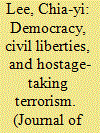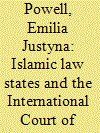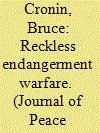|
|
|
Sort Order |
|
|
|
Items / Page
|
|
|
|
|
|
|
| Srl | Item |
| 1 |
ID:
121800


|
|
|
|
|
| Publication |
2013.
|
| Summary/Abstract |
While hostage-taking has been a common form of terrorism for decades, which types of governments are more prone to it remains unclear. Does democracy motivate terrorists to engage in hostage-taking acts because of how easy negotiating with a democratic government is? Or does democracy impose 'audience costs' on the government leaders, driving them never to negotiate with hostage-taking terrorists following the long-held principle of no negotiation? This article argues that hostage-taking terrorists are more inclined to target democratic governments because of the greater value given to human life and personal freedom in democracies. Additionally the helplessness of held hostages is more freely exposed by the media in democracies, which leads to the audience focusing on the hostages themselves rather than on the interests of the nation. This in turns compels decisionmakers to concede, especially near election time. It is only when institutional constraints on the executives are high that democratic leaders refuse to make concessions. Using data on hostage events from 1978 to 2005, this article finds strong evidence that supports this theory, showing that democracy has competing effects on hostage-taking terrorism - civil liberties and press freedom are positively associated with hostage-taking incidents, whereas executive constraints have a negative association.
|
|
|
|
|
|
|
|
|
|
|
|
|
|
|
|
| 2 |
ID:
121797


|
|
|
|
|
| Publication |
2013.
|
| Summary/Abstract |
Empirical analyses of domestic legal traditions in the social science literature demonstrate that common law states have better economic freedoms, stronger investor protection, more developed capital markets, and better property rights protection than states with civil law, Islamic law, or mixed legal traditions. This article expands upon the literature by examining the relationship between domestic legal traditions and human rights practices. The primary hypothesis is that common law states have better human rights practices on average than civil law, Islamic law, or mixed law states because the procedural features of common law such as the adversarial trial system, the reliance on oral argumentation, and stare decisis result in greater judicial independence and protection of individual rights in these legal systems. We also examine how the quality of a state's legal system influences repression focusing on colonial legacy, judicial independence, and the rule of law. A global cross-national analysis of state-years from 1976 to 2006 shows that states with common law traditions engage in better human rights practices than states with other legal systems. This result holds when controlling for the quality of the legal system and standard explanations for states' human rights practices (economic growth, regime type, population size, military regime, and war involvement).
|
|
|
|
|
|
|
|
|
|
|
|
|
|
|
|
| 3 |
ID:
121798


|
|
|
|
|
| Publication |
2013.
|
| Summary/Abstract |
The International Court of Justice (ICJ), as the principal judicial organ of the UN, plays an important role in peaceful resolution of international disputes. Traditionally, relations between Islamic law states, international law, and courts have been relatively tense due to the inherent link between Islamic law and the Islamic faith. Yet, several Islamic law states recognize the ICJ's compulsory and compromissory jurisdiction. This article asks: Why do some Islamic law states extend support to the International Court of Justice, while others turn away from the Court? I argue and empirically demonstrate that specific characteristic of Islamic law can explain variation of Islamic law states' preferences towards the ICJ. After providing original data on the characteristics of Islamic legal structures, I systematically compare pertinent rules of international law and Islamic law, focusing on similarities and differences between the two. Islamic law features such as respect for legal scholarship and peaceful resolution of disputes are compatible with principles embraced by the ICJ. Islamic law states that incorporate these norms are supportive of the Court. In contrast, Islamic law states that directly adopt sharia as the law of the land and incorporate sharia in their education systems are less open to the ICJ's adjudication.
|
|
|
|
|
|
|
|
|
|
|
|
|
|
|
|
| 4 |
ID:
121796


|
|
|
|
|
| Publication |
2013.
|
| Summary/Abstract |
This article examines how military organizations that are generally committed to following the laws and customs of war exploit what the author terms 'the collateral damage exemption', by employing legally-sanctioned war-fighting strategies that result in significant numbers of civilian casualties. This exemption shields combatants from legal liability for 'incidental' or 'inadvertent' civilian losses and the destruction of civilian objects that may occur during lawful actions. The author argues that military strategies which promote the use of overwhelming force under conditions that are likely to adversely affect the civilian population on a significant scale push the boundaries of legal behavior. Under these conditions, collateral damage is not inadvertent, but the calculated results of policy decisions. Most academics, journalists, and political leaders focus on blatant violations of International Humanitarian Law (IHL), for example, deliberate attacks on civilian populations. However, these actions are in many ways the least interesting from both a policy and scholarly perspective. This is because such violations are usually unambiguous, easily detected, and difficult to defend. More insidious are practices that deliberately straddle the line between legitimate action and violation by exploiting the collateral damage exception to IHL. This article demonstrates that high rates of civilian casualties that occur under the shroud of legality threaten the integrity of the laws and customs of armed conflict.
|
|
|
|
|
|
|
|
|
|
|
|
|
|
|
|
| 5 |
ID:
121801


|
|
|
|
|
| Publication |
2013.
|
| Summary/Abstract |
This article introduces the global Pro-Government Militias Database (PGMD). Despite the devastating record of some pro-government groups, there has been little research on why these forces form, under what conditions they are most likely to act, and how they affect the risk of internal conflict, repression, and state fragility. From events in the former Yugoslavia, Iraq, Sudan, or Syria and the countries of the Arab Spring we know that pro-government militias operate in a variety of contexts. They are often linked with extreme violence and disregard for the laws of war. Yet research, notably quantitative research, lags behind events. In this article we give an overview of the PGMD, a new global dataset that identifies pro-government militias from 1981 to 2007. The information on pro-government militias (PGMs) is presented in a relational data structure, which allows researchers to browse and download different versions of the dataset and access over 3,500 sources that informed the coding. The database shows the wide proliferation and diffusion of these groups. We identify 332 PGMs and specify how they are linked to government, for example via the governing political party, individual leaders, or the military. The dataset captures the type of affiliation of the groups to the government by distinguishing between informal and semi-official militias. It identifies, among others, membership characteristics and the types of groups they target. These data are likely to be relevant to research on state strength and state failure, the dynamics of conflict, including security sector reform, demobilization and reintegration, as well as work on human rights and the interactions between different state and non-state actors. To illustrate uses of the data, we include the PGM data in a standard model of armed conflict and find that such groups increase the risk of civil war.
|
|
|
|
|
|
|
|
|
|
|
|
|
|
|
|
| 6 |
ID:
121795


|
|
|
|
|
| Publication |
2013.
|
| Summary/Abstract |
This article examines sending state compliance with arms embargoes. Arms embargoes are one of the most frequently used types of economic sanctions but they are perceived as one of the least effective. One major problem with arms embargoes, many argue, is sending states' failure to implement them. Yet studies tend to focus on cases of arms embargo violations, not compliance in the context of arms export practice more broadly. Using a series of new arms embargo variables, I conduct a statistical analysis of the relationship between arms embargoes and small and major conventional arms transfers from 1981 to 2004. Contrary to popular expectations, I find that arms embargoes on average restrain sending states' arms exports. If arms embargoes do indeed have difficulty changing targets' behavior, or achieving other measures of 'success', additional explanations must also be considered. I suggest that arms embargo target selection and the intractable challenge of cutting off illicit arms flows are two important plausible alternatives. This finding also provides optimism for compliance with international commitments in the absence of institutionalized enforcement mechanisms. Major exporters overall appear to implement sanctions, despite strong economic incentives to ignore them and a lack of formal accountability mechanisms to punish violators.
|
|
|
|
|
|
|
|
|
|
|
|
|
|
|
|
| 7 |
ID:
121799


|
|
|
|
|
| Publication |
2013.
|
| Summary/Abstract |
While transitional justice interventions are common in current post-conflict transitions, recent surveys in such settings suggest that public opinions often vary in their levels of support for such policies. Understanding such opinions is crucial for designing post-conflict policies that properly reflect public interests. This study uses original survey data from Burundi to interpret public opinions toward transitional justice policies in a post-civil war context. The data reveal a great deal of wariness among Burundians toward punishing human rights offenders or seeking the truth about the past. Why would large numbers of those entitled to accountability and truth express a preference to 'forgive and forget'? This question is addressed by focusing on two important features of post-conflict settings - namely (1) uncertainty about the potential for renewed violence and (2) intense competition over how the postwar balance of power should be institutionalized. Findings suggest that the latter feature is indeed crucial: deep partisan motivations associated primarily with ethnicity, and to a lesser extent region, are key determinants of expressed desires to forgive and forget. A reasonable interpretation is that a sense of political gain may compensate for debts owed due to past abuses and induce a preference to avoid the pursuit of truth or punishment lest the political gains somehow be threatened. The conclusion draws out implications for policy and further research.
|
|
|
|
|
|
|
|
|
|
|
|
|
|
|
|
|
|
|
|
|